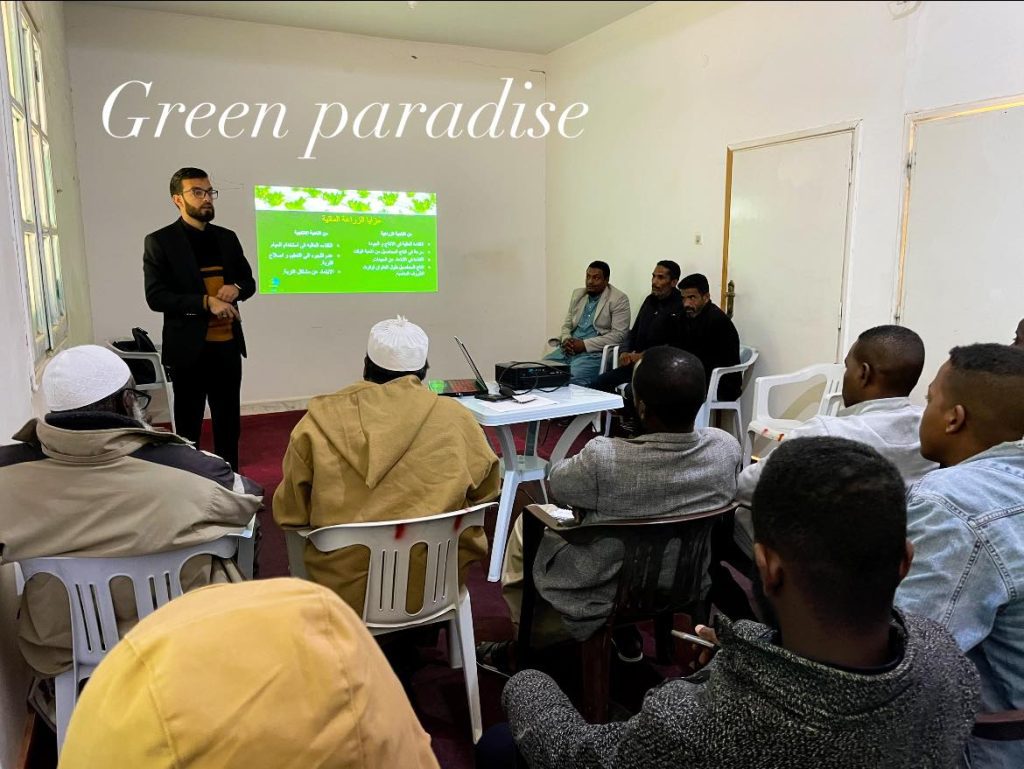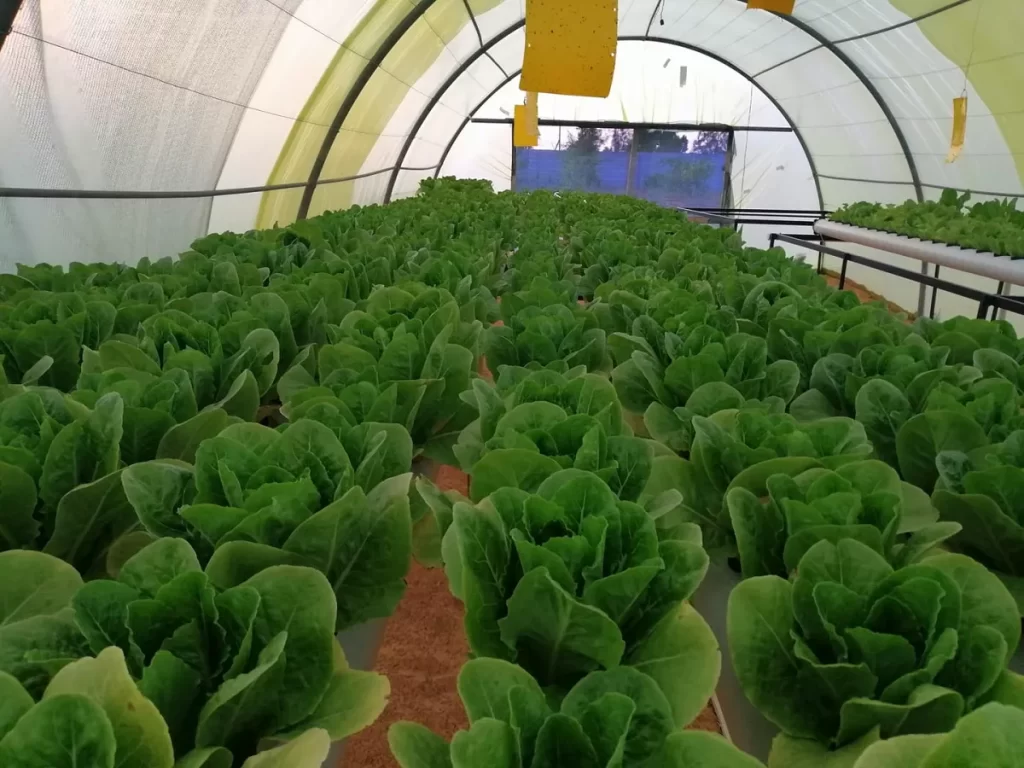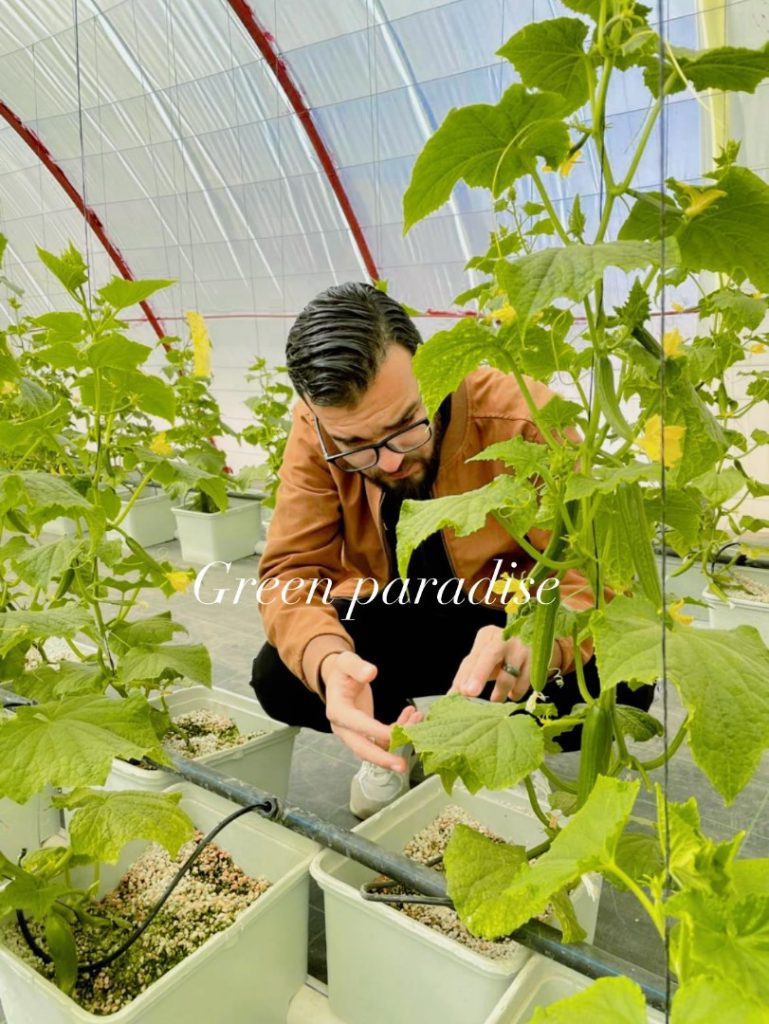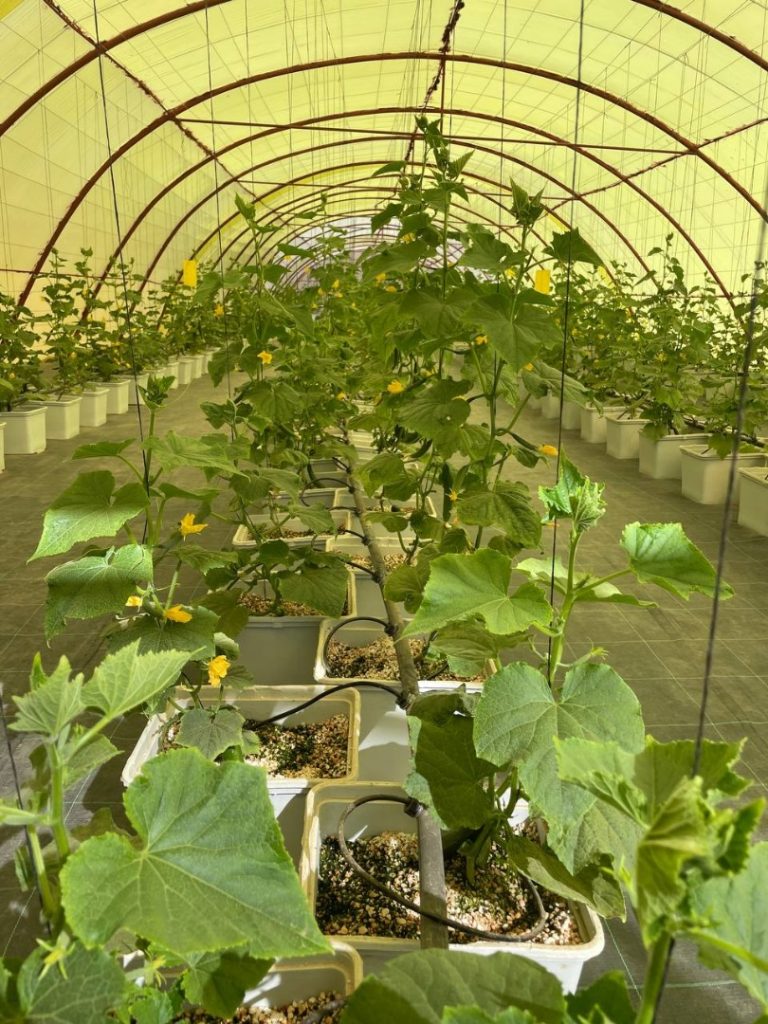Turning Libya into a “Green Paradise”: young eco-entrepreneur supports rural adoption of hydroponics
A far-fetched dream for some, the idea of turning a 90% arid desertic country into a green paradise, has gotten Siraj Mohammed Bisheya out of bed for the past five years. The 32-year-old entrepreneur from Tripoli launched his innovative hydroponics start-up -aptly named “Green Paradise”- in 2019. His vision is that any farmer willing to embrace innovation and change can use hydroponics to improve their crop. With support from the European Union and other partners, Siraj has helped establish 9 projects and reach thousands across rural areas of Libya, spearheading a positive movement for sustainable agricultural change.

Hydroponics: demystifying a sustainable solution for agriculture
Strong of his background in agricultural economics, business administration, and hydroponics, Siraj Mohammed Bisheya had been looking for a way to combine his expertise and passion to address the pressing challenges faced by farmers in Libya.
In recent years, Libyan farmers have had to cope with lethal heat waves destroying their crops, with temperatures reaching nearly 50 degrees Celsius in the summer of 2024.
“The idea of Green Paradise is based on using hydroponic technology to counter the issues of water scarcity and soil degradation,” Siraj explains, insisting on the numerous benefits of this system. It uses a soil-less cultivation method where the soil is replaced by a fertile substrate, with the farmer regulating the nutrient solutions. Hydroponics offers an effective solution that saves up to 90% more water compared to conventional methods.
Green Paradise employs a closed cycle system that reuses water, and helps produce high-quality, pesticide-free crops. This not only preserves the environment but also promotes consumers’ health. “Our hydroponic systems allow agricultural workers to grow a wide range of crops throughout the year, thanks to their complete control over climatic conditions,” Siraj continues. “This way, productivity is increased but most importantly sustainable and stable, which is crucial for food security.”
With the hydroponic technology, plants receive light, nutrients, and water in a precise way, without being exposed to the harsh weather conditions. “That way, farmers are much less dependent on groundwater, which is getting more and more scarce as climate change continues to affect Libya,” the company’s founder notes.

Expanding beyond the capital: empowering rural farmers and communities
While Green Paradise started its operations in Tripoli, its expansion to the south of Libya was a strategic move for Siraj. “Southern Libya is in an even more dire situation than the capital, which puts farmers in the face of incredible challenges. Hydroponics comes as a long-term solution to these problems which are, unfortunately, not going to disappear anytime soon,” he says.
Green Paradise has successfully established nine hydroponic projects in various regions of Libya, including Gubari, Lawinat, Ghat, and Atba Valley. This expansion into rural areas was rooted in Siraj’s commitment to see his country develop “in a more balanced way”, where opportunities get created in under-utilised markets.
But the hydroponics solution is not delivered in a vacuum: the Green Paradise company has provided training programmes for local farmers, in order to equip them with the knowledge and skills needed to effectively use this technology. “We offer continuous technical support and consulting services to ensure the success of these initiatives and we build partnerships with local entities and NGOs to enhance cooperation and achieve greater impact,” Siraj explains.
Omar Salem, a farmer from Sabha, in southern Libya, proudly stands next to his lush green crops under his tent. He explains: “Green Paradise has given us farmers a sustainable and effective solution to improve our productivity and increase our incomes.”
“With this technology, we are sure to have a sustainable income at the end of the month, despite the high temperatures and the lack of rain,” Omar adds. He is one of 500 farmers already trained in hydroponics since 2020. Additionally, Green Paradise reached 1,000 persons through its agricultural entrepreneurship programme.
In southwestern Libya, Khaled Ibrahim remembers how Green Paradise’s help got him back on his feet after “the worst [agricultural year] in memory”. In 2020-2021, prolonged droughts due to heat waves made him and many other farmers from Ubari lose about half of their crops.
“Now, with hydroponics, I can cultivate crops that would have been unthinkable because of the heat,” he says, citing tomatoes, cucumbers and zucchini. He notes that their consistent size, shape and taste have also made them popular with local consumers.
For Siraj, it is an achievement to hear successful testimonies like Omar and Khaled’s as he hopes to see more examples of Green Paradise’s impact on food security, job creation and sustainable development. “I really want to make Green Paradise an impactful initiative that can transform agriculture in all regions of Libya,” he states.

Extended hands: EU support for growth and innovation
Despite the challenges, including the high cost of building a hydroponic tent, the new technology offers hope for the agricultural sector in Libya. With the support of the European Union, initiatives like Siraj’s have a chance to thrive and inspire others.
Siraj himself benefited from the EU’s support, through two EU-funded programmes: Boost It Accelerator and Entrepreneurs of the Future. These programmes provided him with comprehensive training in entrepreneurship and business management when he was getting ready to launch Green Paradise, along with expert guidance and financial support.
“The funding helped accelerate our research and development processes,” Bisheya remembers, noting that “the networking opportunities also allowed us to connect with other entrepreneurs and startups in similar fields, which greatly helped us through exchange of experiences and knowledge.”

Inspiring the Next Generation of Entrepreneurs
“Youth entrepreneurship is a powerful engine for change and economic growth, especially given the challenges facing our country,” Siraj says. “Libyan youth have tremendous capacity for innovation and creativity. Despite difficult conditions, they have a great incentive to turn their ideas into realistic projects.”
He urges young entrepreneurs to embrace innovation and take risks. “Always look for sustainable solutions that enhance your positive impact on society and the environment. Challenges are opportunities for success and change.”
Looking ahead, Green Paradise has ambitious plans to expand its operations and promote sustainability in agriculture. “We aim to increase the number of hydroponic farms in Libya and expand into other North African countries facing similar challenges,” says Siraj. “We will invest in research and development to improve hydroponic technologies and develop new solutions that increase resource efficiency.”
The entrepreneur also plans to expand the company’s training programmes for farmers and local communities and establish partnerships with educational institutions to develop specialised curricula. “We want to collaborate with government agencies, NGOs, and private companies to enhance cooperation and achieve our common goals,” Bisheya explains, aware that “attracting investments to support our growth and operations is key to reaching more farmers.”
Find Green Paradise online:




























 Syria
Syria 


